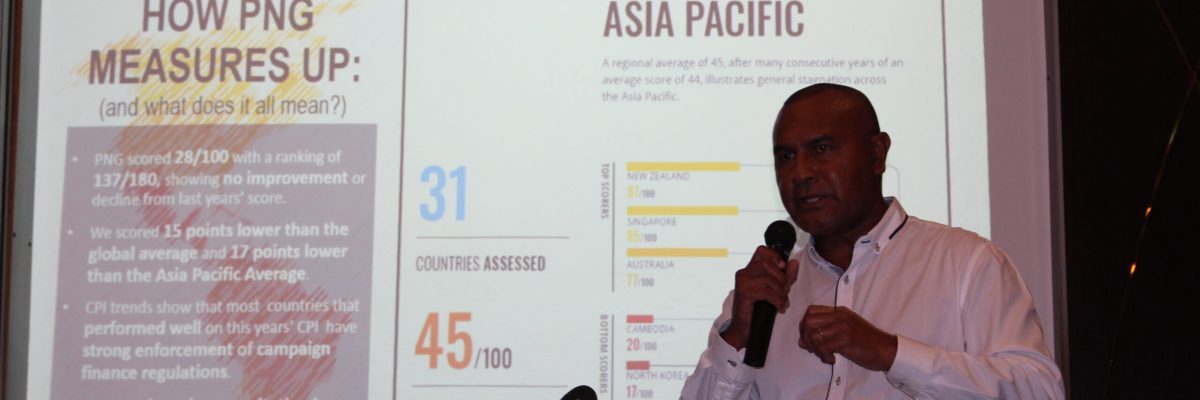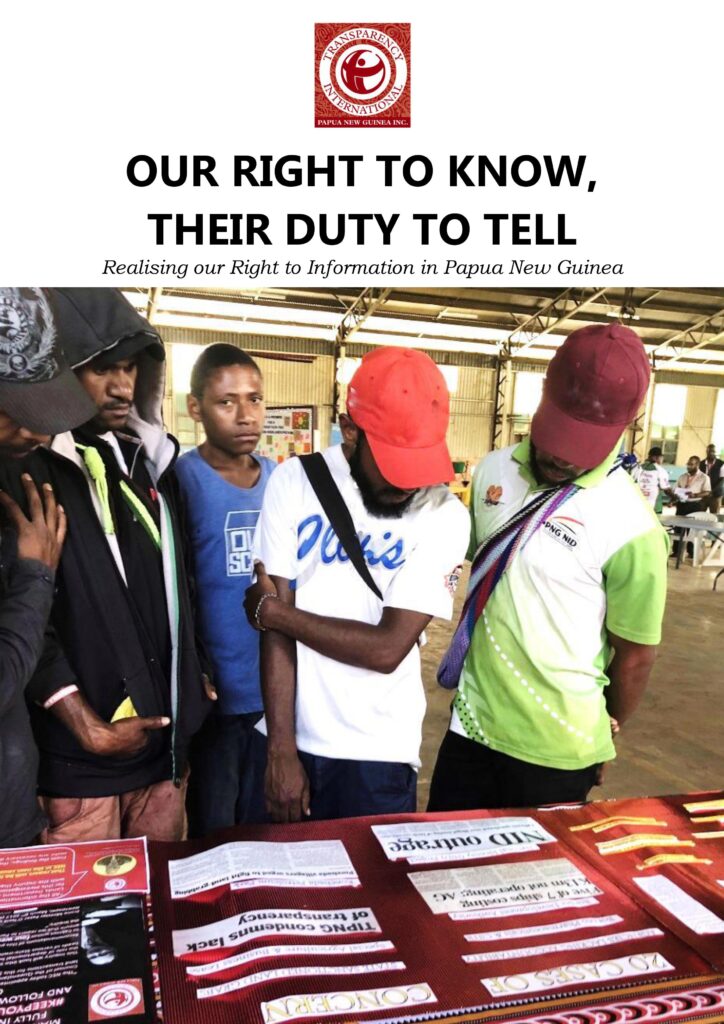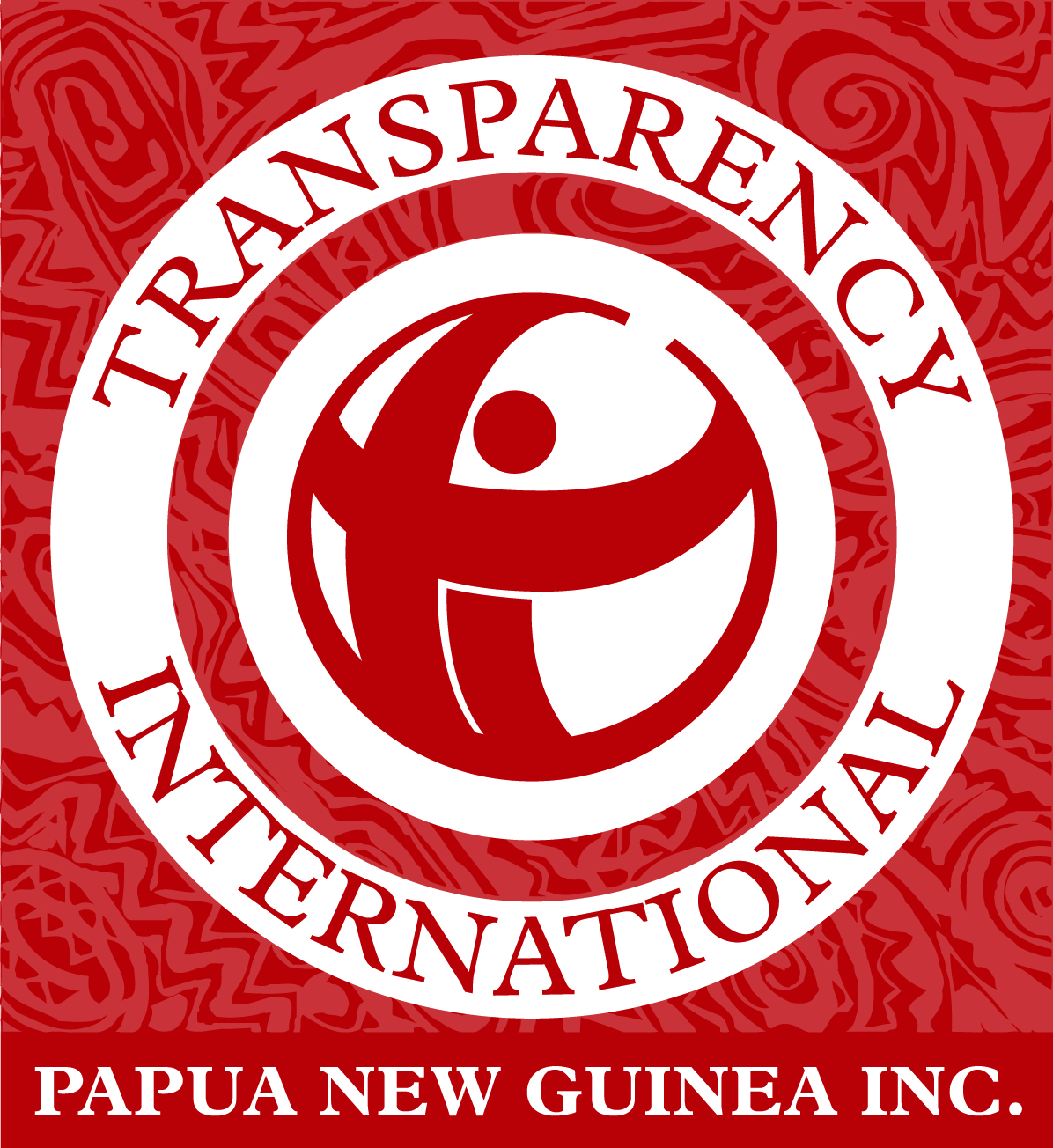Freedom Of Information

At the outset, it is important to note that s.51(3) of the National Constitution of Papua New Guinea, calls for a law “to establish procedures by which citizens may obtain ready access to official information.” This builds on the early efforts during the pre-Independence Department of Information and Extension Services (DIES)
This domestic requirement for an FOI law is further supported by international commitments such as United Nation’s Sustainable Development Goals (SDG)16 and the United National Coalition Against Corruption (UNCAC) which has been ratified by Papua New Guinea.
When TIPNG was established in 1997, enactment of the FOI Law was one of 14 areas of focus. Following consultation, there was initial work done by TIPNG, specifically, Prof. John Nonggorr, to draft an FOI Bill. That Bill was drafted but didn’t progress through to Parliament. That has been the furthest an FOI Bill has been developed.
Within the region, a number of our neighbors have FOI laws, including Australia, New Zealand, Fiji and most recently Vanuatu. Each of these jurisdictions has implemented FOI laws and regulations within their own existing framework e.g. in Australia there is a Federal Information Commission, in New Zealand FOI is part of the work of their Ombudsman and in Vanuatu there is FOI Office, housed within the office of the Prime Minister. In PNG, the absence of an FOI Law has led to a culture of secrecy.
In 2019, TIPNG conducted an assessment of 26 state agencies and found that over 90% of State agencies surveyed were unable to give public documents when requested over the counter, yet these same documents were already available online for 54% of the agencies.
This disconnect between officers and agencies demonstrates the culture of secrecy that has formed in the bureaucracy and the urgent need for structural changes within organizations. Public servants should have a clear process and adequate infrastructure to keep the public informed.
In the 2019 report, TIPNG recommended that PNG have an independent Freedom of Information Commission that could uphold citizen’s constitutional rights.
Open Government Partnership
The OGP is a multi-stakeholder forum through Government and Civil Society can co-create an agenda for reform. Through collaborative dialogue, Government and Civil Society identify commitments in cluster areas that are innovative and impactful. These commitments are then captured in National Action Plans.
PNG’s intent to be a OGP member was endorsed by the National Executive Council (NEC) Decision No.148/2014 and the National Action Plan (NAP) 2018-2020 was endorsed by NEC Decision No. 323/2018. PNG OGP secretariat is currently housed in the Department of National Planning and Monitoring (DNPM) who leads coordination in the implementation of PNG’s NAP.
The NAP has 7 commitments focused on 4 Clusters, namely; Public Participation, Fiscal Transparency Extractive Transparency Initiative and Freedom of Information.
The Freedom of Information Cluster is responsible to deliver 3 Commitments:
- Freedom of Information (FOI) Policy & Legislation
- Greater use of the Integrated Government Information System (IGIS)
- Creation of an Open Data Portal
Under the Freedom of Information (FOI) Cluster, there is a Technical Working Group (TWG) comprised of the following government departments:
- Department of Information & Communication Technology (DICT),
- Department of Justice & Attorney General (DJAG),
- Department of National Planning and Monitoring (DNPM),
- Constitution and Law Reform Commission (CLRC),
- National Information & Communication Technology Authority (NICTA).
- Transparency International PNG (TIPNG); and
- the Centre for Environmental Legal Community Rights (CELCOR)
Progress on PNG FOI Policy and Bill
The FOI TWG have developed a Legislative Development Timeline which initially aimed for the Draft FOI Bill to be delivered by June 2020, however this was further extended to June 2021 due to delays caused by the global pandemic.
In 2019, TIPNG provided a similar briefing to the DICT and DJAG representatives, there was also a meeting These resources include:
- Previous work done by Professor Nonggorr on a FOI Law
- Discussion Papers on the Need for the Freedom of Information Legislation
- Working Report on Aspects to be included in a FOI Law Polzer, T (1999)
- Freedom of Information: A Proposal to Prepare Legislation (TIPNG, February 2 2001)
- Official Secrets and Data Protection (Newell LM, November 1 2000)
In July 2020, TIPNG co-facilitated a webinar with the UN Pacific Regional Anticorruption (UNPRAC) team to present the different models of FOI in the Pacific. FOI experts from Vanuatu, New Zealand and Australia presented key elements for the FOI legislation and shared their experiences to inform the drafting team.
The FOI TWG have agreed that DICT would take lead in drafting the Policy and that DJAG would use the FOI Policy to draft the proposed FOI Bill. The focus areas of the FOI policy will be on capturing international best practices including existing government policies, legislation, standards and initiatives will be taken into consideration. Development of FOI legislation will align with the visions and aspirations envisioned in the National Constitution of Papua New Guinea.
Way Forward
The 1st PNG OGP NAP will lapse in August 2021, and a new National Action Plan for PNG will need to be developed. There is still time to collaborate with colleagues in the PNG OGP FOI TWG to align drafting of the FOI Policy with the FOI legislation. However, it will require high-level support from the three agencies, DCIT, DJAG and DNPM.
In most OGP implementing countries that didn’t have an FOI framework, the 1st National Action Plan has provided the impetus to create and implement FOI legal and policy frameworks. TIPNG also notes that the Government is keen on supporting the enactment of FOI as one of the key anti-corruption legislations that will support both the Whistle-blowers and Independent Commission Against Corruption (ICAC) Legislation. Further to this, the FOI legislation has been prioritized by development partners such as the European Union.
In closing, as you would have heard from the panel discussion on Dangerous Information at the 1st National Integrity Summit, there is a keen desire from Civil Society and the Private Sector for a legislated process to access public information. The OGP framework also speaks to the broader digital governance space, as the 2nd and 3rd commitments are focused on the infrastructure considerations, between agencies and with citizens.


